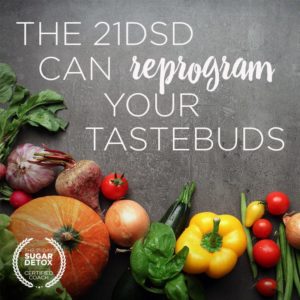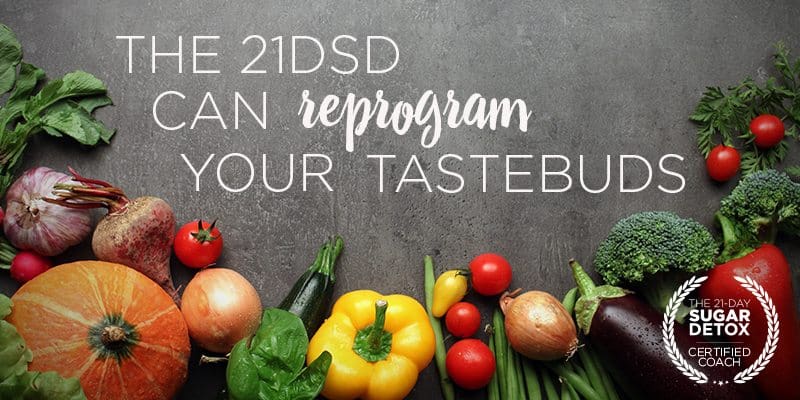Hey Folks! We're excited to welcome back Certified 21DSD Coach Michal Ofer. Michal's article is part of a series contributed by our Certified 21DSD Coaches. Enjoy! – Diane and Team
Food should not just taste good, it should also make you feel good, not just the moment during or right after eating it, but for the days, weeks and months that follow. The desire for real, nourishing food is instinctual to us, and given the right tools, you will naturally be tempted by the inherent tastes found in the foods nature has provided.
Participating in a 21DSD is a stepping stone to learning to appreciate the inherent taste and goodness found in whole, real foods: the sweetness in vegetables; the density found in nuts, seeds and naturally occurring fats and oils; and the savory tastes of animal proteins.
Processed or fast food options will never be better than healthy home-cooked meals. Preparing your own food is by far the best way to ensure you are eating the highest quality, most nutritious food. The 21DSD provides a great foundation to tap into your inner culinary creativity, no special training needed. A sense of adventure, a little knowledge and dollop of imagination can spark your cooking and tasting journey.
Your first step is to reprogram your taste buds and retrain your brain to ditch those cravings for the sugars, refined starches and man-made fats that have enslaved you. On the 21DSD, you start by eating real, fresh, whole foods and avoiding fake foods and food-like substances: processed, commercialized goods that are made in a plant rather than grown on a plant. These are easy to notice in their convenient packages with enticing labels, deflecting from their sinister contents.
At first, this may sound difficult, or boring. I have some sure-fire methods to get you excited about eating real food and ignited about effectively fueling your body, ditching all those added manufactured sugars and health-depleting fats, effectively retraining your taste buds to how delicious real nutrition can be.
 Sautéing or roasting vegetables brings out their natural sweetness. Searing your animal protein, creating a nice brown crust, brings out the inherent flavors of the meat. Olive oil adds wonderful savoriness and mouth texture to both. This flavorful fat signals the brain that you are full, and keeps you full, reducing the craving for a quick sugar fix.
Sautéing or roasting vegetables brings out their natural sweetness. Searing your animal protein, creating a nice brown crust, brings out the inherent flavors of the meat. Olive oil adds wonderful savoriness and mouth texture to both. This flavorful fat signals the brain that you are full, and keeps you full, reducing the craving for a quick sugar fix.
- The flavor of a meal can be further enhanced by the addition of fresh herbs just before serving. Cilantro, parsley, oregano, basil, dill and marjoram have unique tastes and aromas and come packed with phytonutrients (plant based nutrition).
- Incorporating a good amount of healthy fats, like those found in avocados, coconut and tahini add that creamy, luscious texture found in many rich, tantalizing foods. You will increase the flavor of what you are making, and create a dish worthy of temptation and totally free of added chemicals, additives and food-like substances.
- Coconut aminos, balsamic vinegar, tomato paste, dried exotic mushrooms, and anchovies (seriously, they are delicious and indiscernible when added to foods) added to soups, stews, sauces and stir-fries provide that savory “umami” flavor. This is what the Japanese call our 6th taste, and it is very satisfying to those salty/fatty cravings.
- Spices that excite your taste buds, like cinnamon, allspice, nutmeg, clove, ginger, and even cayenne or chipotle pepper powders are all extremely flavorful additions to a meal. Flavors that grab your attention help you focus on actually tasting our food rather than mindlessly gobbling it up.
- Become accustomed to using some culinary essentials like real vanilla extract, vanilla beans or coconut butter. It is also wise to incorporate what you may consider common, every-day foods like lemons in some creative ways. For example, using lemon zest will add real zing to any meal!
- Eating seasonally and locally will ensure the best flavor. The succulence of freshly harvested vegetables is no match for something that has travelled great distances on the back of a truck. Canned or packaged foods lose much of their fresh taste and texture and often contain extra additives.
In addition to choosing exciting flavors and ingredients to help retrain your taste buds to appreciate and enjoy real, whole food, there are a few more things to consider.
- Digestion starts in your mouth with your saliva, which helps you taste all the unique, individual flavors of the foods you are eating. Dehydration may result in you not producing enough saliva, not allowing you to properly taste, enjoy and savor your food. Make sure you are well hydrated throughout the day.
- Most medications interfere with your ability to both taste and smell (a large part of your taste is produced by aroma). Some can even cause you to have unpleasant or foreign tastes in your mouth. Check your medications and their side effects. Once eating more whole, real food becomes a part of your routine, you may require less of these medications as your body is given the tools to possibly learn to heal itself.
- Probably one of the most important causes of improper taste perception is nutrient deficiencies. A lack of certain nutrients (especially zinc and magnesium) can greatly impact your ability to both taste and smell your food. Many living in Western societies suffer from nutrient deficiencies due to poor diet, environmental and lifestyle factors. Oysters, dark leafy greens and nuts and seeds are good additions to your 21DSD food plan. Working with your doctor can determine if an additional supplement is needed or if any further deficiencies exist.
If you would like more guidance in incorporating a real food eating plan into your lifestyle, or more assistance in how to break free of the hold sugars, unhealthy fats and manufactured foods have on your life, it is a smart idea to invest in the services of a professional coach, someone to walk you through the process, keep you accountable and on track when you need it, answer questions and deal with obstacles when they arise, and most important of all, be your cheerleader. After all, you, your health, and your longevity are worth it!

Michal Ofer is a certified life coach, health coach and 21DSD coach.
She has always had a love for food, cooking and all things nutrition related. Michal grew up in South Africa where she studied biological sciences and got her degree in Optometry with a minor in holistic nutrition. After some travelling, disguised as learning overseas, Michal immigrated to Canada where she worked in business development and team building. A less than positive experience with the current acute care medical system and “Standard American (Canadian) Diet” whilst trying to overcome a chronic health issue led Michal on a path to discovering that food truly is our best medicine and that all healing begins in the gut. Once recovered, Michal wanted to help others reach their optimal level of health, wellness and vitality that a real food approach to diet gives. Michal is a nutritional consultant working with individuals looking to improve their general well-being, with a special emphasis on naturally and holistically healing the damage that disordered eating creates in the entire digestive system. When not counselling others or trying to keep up to date with the online world, Michal is an amateur cook, testing her newest food creations on brave volunteers. She can be reached at [email protected] for further insight into moving beyond eating disorders.


Comments 4
Would like more recipes for breakfast .. Like to Join the challenge too
Author
Thanks for your comment! If you’d like to join a 21DSD group, please visit http://21daysugardetox.com/coaches/ to find a coach or group in your area. Many coaches also coach online groups!
Great article! Never thought a program would be able to make you look at food in a different way but it makes sense! It truly opens your eyes to different ways to cook different foods that is also healthy for you! Thank you!
Inspiring article